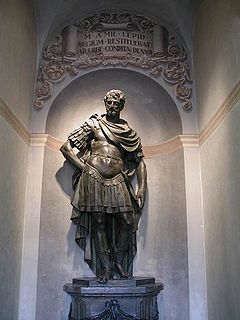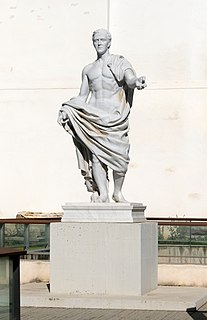Related Research Articles
This article concerns the period 139 BC – 130 BC.
Year 189 BC was a year of the pre-Julian Roman calendar. At the time it was known as the Year of the Consulship of Nobilior and Vulso. The denomination 189 BC for this year has been used since the early medieval period, when the Anno Domini calendar era became the prevalent method in Europe for naming years.
Year 212 BC was a year of the pre-Julian Roman calendar. At the time it was known as the Year of the Consulship of Flaccus and Pulcher. The denomination 212 BC for this year has been used since the early medieval period, when the Anno Domini calendar era became the prevalent method in Europe for naming years.
Quintus Fulvius Flaccus, son of Marcus Fulvius Flaccus, was consul in 237 BC, fighting the Gauls in northern Italy. He was censor in 231 BC, and again consul in 224 BC, when he subdued the Boii. He was a praetor in 215 BC and in 213 BC Master of Horse in the dictatorship of Gaius Claudius Centho.
The gens Fulvia, originally Foulvia, was one of the most illustrious plebeian families at ancient Rome. Members of this gens first came to prominence during the middle Republic; the first to attain the consulship was Lucius Fulvius Curvus in 322 BC. From that time, the Fulvii were active in the politics of the Roman state, and gained a reputation for excellent military leaders.

Marcus Aemilius Lepidus was a Roman consul, Pontifex Maximus, Censor and Princeps Senatus. A scion of the ancient Patrician gens Aemilia, he was most likely the son of Marcus Aemilius Lepidus, with his brothers being Lucius and Quintus.

The Basilica Aemilia was a civil basilica in the Roman Forum, in Rome, Italy. Today only the plan and some rebuilt elements can be seen. The Basilica was 100 meters (328 ft) long and about 30 meters (98 ft) wide. Along the sides were two orders of 16 arches, and it was accessed through one of three entrances.
Appius Claudius Pulcher was a Roman politician of the 2nd century BC.
Gnaeus, also spelled Cnaeus, was a Roman praenomen derived from the Latin naevus, a birthmark. It was a common name borne by many individuals throughout Roman history, including:
Marcus Fulvius Nobilior was a Roman general, and a member of one of the most important families of the plebeian Fulvia gens.

The first Battle of Herdonia was fought in 212 BC during the Second Punic War between Hannibal's Carthaginian army and Roman forces led by Praetor Gnaeus Fulvius Flaccus, brother of the consul. The Roman army was destroyed, leaving Apulia free of Romans for the year.
Marcus Fulvius Flaccus was a Roman senator and an ally of the Gracchi.
Gnaeus Manlius Vulso was a Roman consul for the year 189 BC, together with Marcus Fulvius Nobilior. He led a victorious campaign against the Galatian Gauls of Asia Minor in 189 BC during the Galatian War. He was awarded a triumph in 187 BC.

Marcus Claudius Marcellus was Roman consul for the years 166 BC, for 155 BC, and for 152 BC.
Publius Licinius Crassus Dives was consul in 205 BC with Scipio Africanus; he was also Pontifex Maximus since 213 or 212 BC, and held several other important positions. Licinius Crassus is mentioned several times in Livy's Histories. He is first mentioned in connection with his surprising election as Pontifex Maximus, and then several times since in various other capacities.

Quintus Caecilius Metellus was a pontiff in 216 BC, aedile of the plebeians in 209 BC, curule aedile in 208 BC, magister equitum in 207 BC, consul in 206 BC, dictator in 205 BC, proconsul of Bruttium in 204 BC, and an ambassador at the court of Philip V of Macedon in 185 BC.
Quintus Fulvius Nobilior was a Roman consul who obtained the consulship in 153 BC. His father Marcus Fulvius Nobilior and his brother Marcus Fulvius Nobilior were also consuls.
The gens Aburia was a plebeian family at ancient Rome during the latter centuries of the Republic, and the first century of the Empire. The first member of this gens to achieve prominence was Marcus Aburius, praetor peregrinus in 176 BC.
This section of the timeline of Hispania concerns Spanish and Portuguese history events from the Carthaginian conquests to before the barbarian invasions.
References
- ↑ Livy, "Ab Urbe Condita", book xlii. 32
![]() This article incorporates text from a publication now in the public domain : Smith, William, ed. (1870). "Nobilior (3)". Dictionary of Greek and Roman Biography and Mythology . 2. p. 1206.
This article incorporates text from a publication now in the public domain : Smith, William, ed. (1870). "Nobilior (3)". Dictionary of Greek and Roman Biography and Mythology . 2. p. 1206.